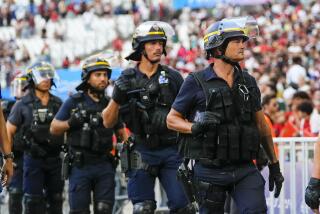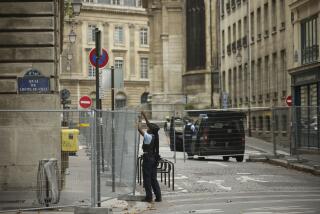Games were plot target, China says
- Share via
BEIJING — The Chinese government said Thursday that it had busted an Islamic terrorist ring that intended to stage suicide bombings and kidnap athletes, tourists and journalists to sabotage the 2008 Summer Olympics.
The Public Security Ministry said 45 people from two terrorism cells in and around Urumqi, capital of the Xinjiang region, were arrested in January and last week.
Ministry officials said authorities had seized explosives, poisons, detonators and literature calling for a jihad, or holy war. The suspects confessed to planning to blow themselves up in Urumqi and to attack hotels and government and military buildings in Shanghai and Beijing, the ministry said.
“The terrorism group was secretly recruiting members in China . . . and many times they sent members abroad for training,” ministry spokesman Wu Heping said at a news conference. “Their aim was to undermine the Beijing Olympics.”
But authorities offered little evidence to support the claim, leading to some skepticism. Human rights experts say China previously has exaggerated claims of terrorist plots as an excuse to crack down on restive elements of its population.
With embarrassing protests taking place inside and outside the country, including in San Francisco, where officials Wednesday changed the route of the Olympic torch relay to avoid demonstrators, the Chinese government has been rounding up potential troublemakers in its western provinces.
Ministry officials said the suspects were part of the East Turkestan Islamic Movement, a little-known group from the nation’s west. East Turkestan is a name sometimes used by Uighurs, an ethnic Turkic people, to refer to the Xinjiang region.
In 2002, the United States labeled the East Turkestan Islamic Movement a terrorist group. Uighurs were implicated in several bus explosions in Urumqi in the mid-1990s, but since 1997 it has been thought that Uighur separatism was on the decline.
Nicholas Bequelin, a Hong Kong-based researcher with Human Rights Watch, noted that Xinjiang has many criminal gangs that have weapons and often use explosives for illegal mining.
“China has a long history of conflating all sorts of incidents under the label of terrorism. . . . If this is true, it has international implications because of the targeting of athletes, but Beijing needs to provide hard evidence,” Bequelin said.
Terrorism experts criticized China last month for failing to back up a claim that Uighurs had tried to blow up a China Southern jetliner flying from Urumqi to Beijing. A 19-year-old woman on the flight was arrested with gasoline canisters.
The announcement Thursday came at a particularly stressful time for China, which finds itself under siege by demonstrators at home and abroad protesting its human rights record. After protests during the torch relay in London, Paris and San Francisco, International Olympic Committee President Jacques Rogge on Thursday characterized the Summer Olympics, which begin Aug. 8, as being in “crisis.”
“Athletes in many countries are in disarray and we need to reassure them. Our major responsibility is to offer them the Games they deserve,” Rogge told reporters in Beijing, where Olympic officials are attending a two-day meeting.
“It is a crisis. There is no doubt about that, but the IOC has weathered bigger storms.”
Rogge mentioned the 1972 Olympics in Munich, Germany, where 11 Israeli athletes were killed after being taken hostage by Palestinian militants.
Anti-China demonstrations began last month in Tibet, and protests sympathetic to the Tibetans have intensified around the globe. According to Uighur leaders, Chinese authorities have been preemptively arresting Uighurs in recent weeks for fear that they will be inspired by the Tibet unrest.
Without a charismatic leader like Tibet’s Dalai Lama, the Uighurs lack an international following, but their issues are similar. Their culture has been diluted by the mass migration of Han Chinese to the westernmost provinces of China and they are limited in the practice of their religion.
“To Beijing, any Tibetan or Uighur who is unhappy with China’s harsh rule is a ‘separatist.’ Uighurs are also labeled ‘terrorists,’ ” Rebiya Kadeer, a well-known Uighur exile leader, said this month in an editorial in the Washington Post.
--
More to Read
Sign up for Essential California
The most important California stories and recommendations in your inbox every morning.
You may occasionally receive promotional content from the Los Angeles Times.













